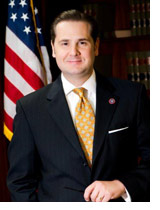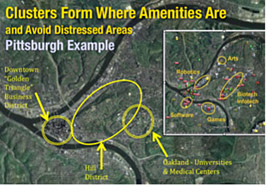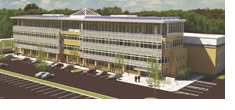Q&A with Christopher A. Masingill,
Federal Co-Chairman, Delta Regional Authority

Chris Masingill is the Federal Co-Chairman of the Delta Regional Authority, appointed by the President and confirmed by the U.S. Senate. The Delta Regional Authority is a federal-state partnership that serves 252 counties and parishes in parts of Alabama, Arkansas, Illinois, Kentucky, Louisiana, Mississippi, Missouri, and Tennessee.
Q: How has the Delta Regional Authority supported rural and small business development across the country?
A: Since its creation in 2000, the Delta Regional Authority has invested in business development throughout the 252 counties and parishes that make up the Delta region to support job creation. In addition to our other three project areas including public infrastructure, transportation infrastructure, and workforce development, small business development is an integral part of promoting economic prosperity and quality of life in the Delta's communities. As Federal Co-Chairman, I have a special focus on supporting small businesses and entrepreneurs. They are the backbone of our economy and their growth is crucial to the success of rural America and the Delta region.
As part of our commitment to the growth of entrepreneurs and small businesses, the DRA supports Operation JumpStart, a successful entrepreneurship training program in Southeast Missouri. In partnership with the Douglas C. Greene Center for Innovation and Entrepreneurship (CIE) at Southeast Missouri State University, the Small Business Administration and the Delta Leadership Network, we will expand Operation JumpStart to all eight states in the Delta region by training community leaders to run successful Operation JumpStart programs of their own. Homegrown entrepreneurs will invest in their community's future and create good-paying jobs. To learn more or to sign up for this program, visit www.operationjumpstart.biz.
Gaining access to capital is an ongoing challenge for small businesses and entrepreneurs but a recent analysis shows heartening news that SBA loans for the creation or expansion of businesses are on the rise in the Delta. I support opportunities for capital access such as the expansion of innovative microenterprise development organizations to provide credit and services to small businesses that do not have access to loans from commercial sources.
Q: Nearly 60 million Americans live in rural areas. President Obama has tasked U.S. Department of Agriculture Secretary Tom Vilsack with leading the White House Rural Council to support efforts to build economic growth and improve the quality of life in rural America, which accounts for just over 20% of the population. What role is the Delta Regional Authority playing?
A: The Delta is home to nearly 10 million people and 75% of Delta Counties and parishes are rural. The Delta Regional Authority believes that Rural America’s success determines the Delta’s success.
As an active participant in the White House Rural Council, we are hosting a number of White House Rural Council meetings for the public in our region to seek input on ways federal, state and local officials can help improve economic conditions and create jobs in Rural America. It is my belief that the Delta Regional Authority is an advocate for the families and businesses of the Delta and that the White House Rural Council meetings will give voice to innovative economic development strategies that boost small business growth.
A recent study shows that life expectancy for men and women in the Delta region, is years behind the national average. The disparities between the Delta region and the nation as a whole are stark. With the Delta Regional Authority’s investments in the health and economic prosperity of our largely rural region, we helped create and retain nearly 50,000 jobs. By keeping the spotlight on rural America’s strengths as well as needs, we can coordinate federal resources and maximize investments across agencies.
Q: Based on the work of the Delta Regional Authority, what are some of the challenges and opportunities for small business development in the areas the organization represents?
A: The Delta is a place where daily life remains a struggle for many. Some communities depend on the Delta Regional Authority to improve basic infrastructure in order to attract business and industry and improve quality of life. 17,000 families have received sewer or clean water service because of our investments in basic infrastructure. Some communities face historic difficulty gaining access to capital and the Delta Regional Authority supports the expansion of innovative solutions like CDFI funded programs and microenterprise development organizations that provide credit and services to small businesses lacking access to loans from commercial sources.
I witnessed the significant damage caused by this spring’s severe storms and floods to Delta families and businesses. As we begin the long road to recovery from these events, I am committed to supporting a coordinated response to help businesses reopen and families rebuild.
The Delta Regional Authority has advocated for the expansion of technical assistance for federal resources. In addition to moving our application process online for added convenience, we are working with several federal partners to expand technical assistance so that every Delta community has the same opportunity to access federal resources.
Feature Article: Regional Innovation Clusters
and Economic Revitalization
By Dr. Christina Gabriel, President, University Energy Partnership and Member of the National Advisory Council on Innovation and Entrepreneurship & Bomani M. Howze, MBA, Vice President, University Energy Partnership
Innovation-driven industry clusters are powerful engines for job creation and sustainable economic growth. Yet even in regions with strong clusters, a rising tide does not automatically lift all boats. Small geographic pockets can become more affluent and more crowded while even in nearby neighborhoods high rates of unemployment and poverty can persist.
How can the economic engines of innovation clusters instead offer bridges to opportunity and help revitalize distressed communities?
Certainly there is no silver bullet to eliminate longstanding economic disparities and break the cycle of intergenerational poverty. But even highly specialized technology clusters can offer a broad range of opportunities for employment and entrepreneurial business growth throughout a local supply chain. With collaborative planning, investments in technology-based economic development can be accompanied by parallel investments in community-based programs targeted to support the needs of the individuals and businesses seeking opportunities made possible by the region's growing clusters.

Pittsburgh's Hill District, home of playwright August Wilson, was once a community rich with demographic diversity and cultural life, including especially the places that bred its strong jazz tradition. Today it is a predominantly African American community still struggling to recover economically from the federally subsidized "Urban Renewal" bulldozing that displaced 8000 residents fifty years ago and severed their social and business networks.
Located on high ground with spectacular views and sandwiched between the region's downtown business district and the campuses of its major research universities, the Hill District has continued to experience high rates of poverty, unemployment and crime even though technology-based clusters of new, high-growth firms are aggregating in the adjacent neighborhoods.
Five years ago a state-supported program created an "innovation zone" centered in the Hill District with incentives to attract technology-based firms. Philanthropic foundations, universities and nonprofits have been collaborating to design and fund a series of mutually supporting interventions to complement this state seed funding.
Programs include microfinancing for African American and African immigrant entrepreneurs with connections to suppliers on the African continent and diaspora; a cooperative of women entrepreneurs who do business according to the African principle of Ujamaa; a university pharmacy that serves the community while training students; entrepreneurship training for ex-offenders; and the restoration of the Hill District's iconic historical sites to become new social, cultural and business venues.
A former public school building is being renovated as an energy-sector innovation center, including a workforce training program for green building operating engineers, a business incubator, a university laboratory, and a corporate showcase.
Progress has been fragile but significant. Coordination among nonprofits, educational institutions, individual investors, and philanthropic foundations has kept projects moving forward in the face of the economic downturn and the loss of state funding. The number of technology-based companies is increasing steadily and the pace of private-sector development is picking up. Ground was broken last year for the community's first grocery store in decades.
In time, Pittsburgh's celebrated transformation from a one-industry steel town to a diverse, "most livable city" may become the story of the Hill District community as well.
Dr. Christina Gabriel is president of the University Energy Partnership, a collaboration co-founded in 2010 by Carnegie Mellon University, the University of Pittsburgh, Penn State University, Virginia Tech, and West Virginia University to focus on energy technology research and regional innovation cluster growth. Previously she directed Innovation Economy grant making at The Heinz Endowments in Pittsburgh, PA, and prior to that she was vice provost and chief technology officer at Carnegie Mellon University. Dr. Gabriel is a member of the National Advisory Council on Innovation and Entrepreneurship.
Bomani Howze is vice president of the University Energy Partnership and also was formerly with the Heinz Endowments Innovation Economy program. He has been a nonprofit executive, an entrepreneur and a public-school teacher and was appointed by Governor Ed Rendell to serve on the Pennsylvania Minority Business Development Authority.
NOAA: Cultivating the Next Generation of STEM Workers, One Student at a Time
STEM workers are driving our nation’s innovation and competitiveness and helping America “win the future” with new ideas, new businesses and new industries. Read about how the National Oceanographic and Atmospheric Administration (NOAA) is working to help college students obtain degrees in many STEM fields.
4 Ways the Department of Commerce Can
Help
You Expand Your Business
By Courtney Gregoire, Director of the National Export Initiative,
United States Department of Commerce
EXCERPT: Business owners aren't always aware of all the resources the government makes available for them. For example, the Department of Commerce has tools to directly help companies at every point in the business life cycle. And we're particularly focused on helping the small and medium-sized businesses that create over half of all new jobs. Read more.
SPOTLIGHT: Ben Franklin TechVentures Named to Inc. Website's Top 10 List

EXCERPT: Ben Franklin TechVentures®, owned and operated by the Ben Franklin Technology Partners of Northeastern Pennsylvania (BFTP/NEP) has been selected as one of “10 Startup Incubators You Need to Watch” by Inc.com. A $6 million grant funded by the Recovery Act through the U.S. Commerce Department’s Economic Development Administration and other state and federal grants, BFTP/NEP funding, and private contributions, allowed Ben Franklin to support the necessary expansion to Ben Franklin TechVentures2. Click here to read more
INNOVATE@EDA
EDA Solicits Applications for Three New Research and National Technical Assistance Program Federal Funding Opportunities
The U.S. Economic Development Administration (EDA) has announced three new Federal Funding Opportunities under its Research and National Technical Assistance programs, which fund research and technical assistance projects to promote competitiveness and innovation in distressed rural and urban regions throughout the United States and its territories. Applications for each are due on August 15, 2011.
Public Input Requested for Strong Cities, Strong Communities Challenge, Deadline August 9
The Obama Administration announces and requests public comments on the structure of the Strong Cities, Strong Communities Challenge, which is a component of the SC2 Interagency Initiative led by the White House Office of Urban Policy. In addition to the six pilot locations, SC2 includes an Economic Planning Challenge designed to help additional cities develop economic blueprints, which will be administered by EDA. Six cities will be competitively selected to receive a grant of approximately $1 million that they will use to administer an “X-prize style” competition, whereby they will challenge multi-disciplinary teams of experts to develop comprehensive economic and land use proposals for their city. EDA invites comments from interested parties in both the public and private sectors to be considered in the formulation of the FFO announcement for the SC2 Pilot Challenge. Click here for more information.

